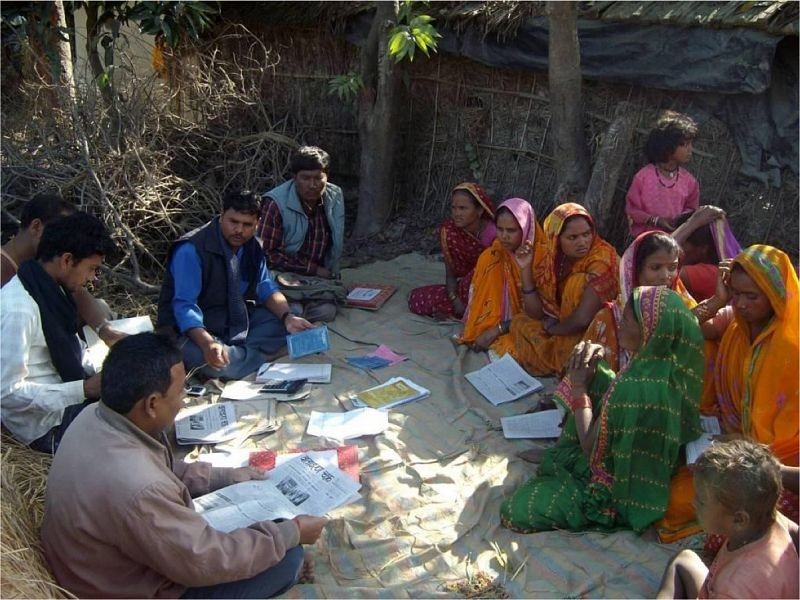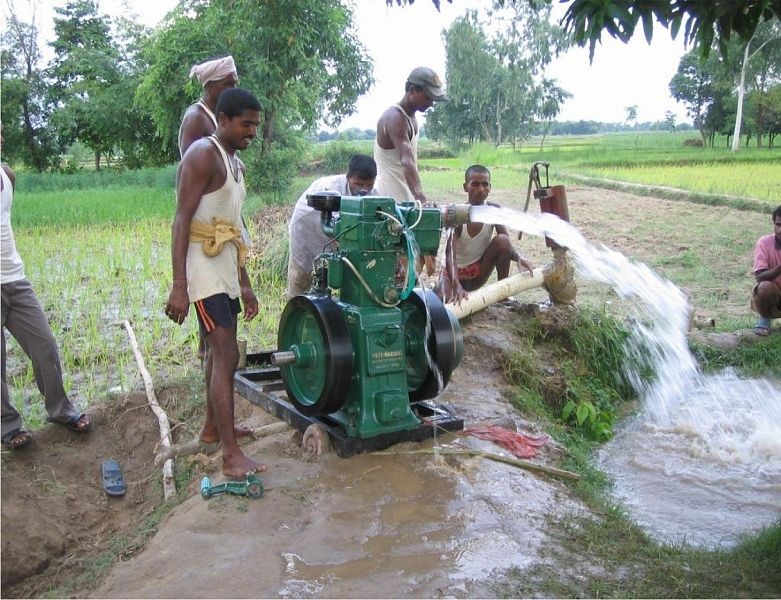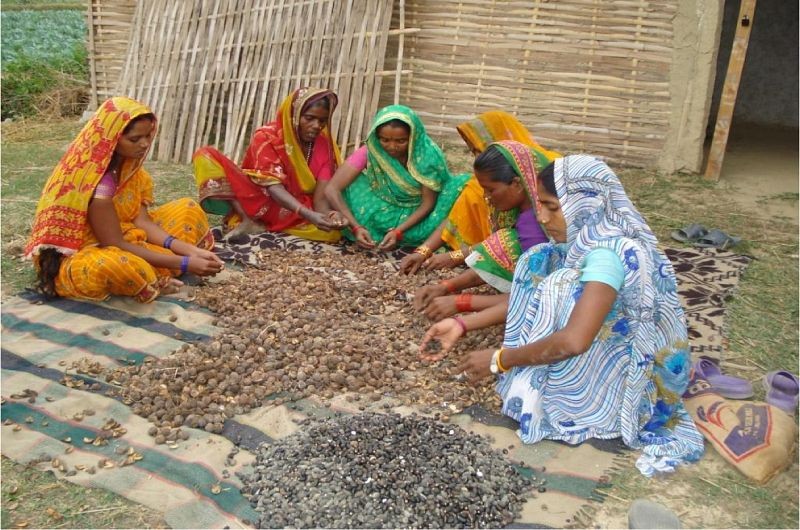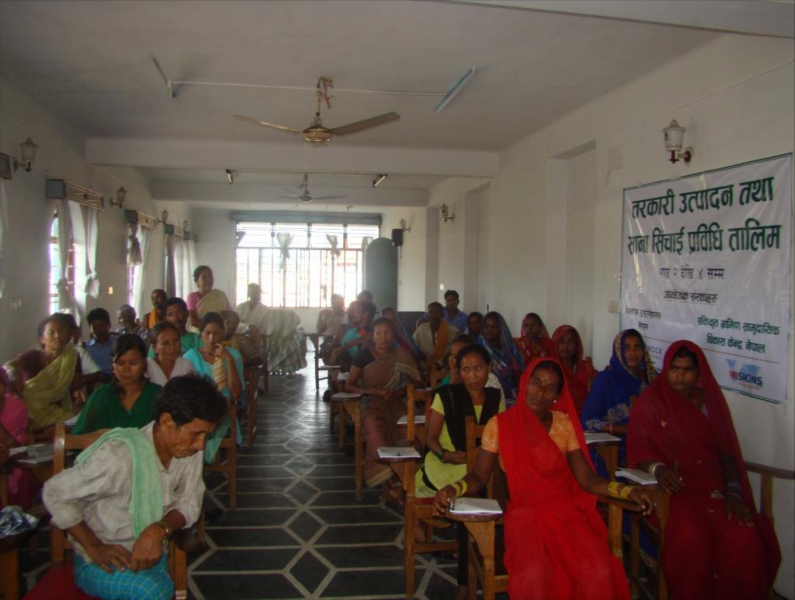To increase the productivity and Efficiency of Nepal's agricultural sector AND alleviate poverty in rural Communities by means of a sustainable irrigation system
This project, located in the Siraha district in Nepal, promoted the local production of Jatropha oil and its use for powering irrigation systems. Nepal's economy is largely based on agriculture: 80% of the population depends on this sector for its income and employment. As there is insufficient access to affordable electricity and diesel, agricultural productivity is low and the majority of the farmers are poor.
To improve the standard of living in rural communities this project aimed to increase the vegetable yield from dry agricultural land by means of the installation of an ecological and sustainable irrigation system that uses pumps driven by Jatropha oil.

The project activities covered three major areas:
- Raising local awareness about how Jatropha seeds can be used as a sustainable energy source and how to improve the collection of seeds;
- Establishment of 3 expelling centres and the installation of 25 irrigation pumps in selected communities; and
- Capacity-building training on vegetable farming and irrigation.
Technology, Operations and Maintenance

Jatropha oils are mostly suitable as a liquid fuel in slow speed engines and do not have to be specially processed for this purpose. However, due to the higher viscosity of Jatropha oil compared to diesel, the engine had to be modified for this project. In India, as well as in other countries, modified diesel engines had already been tried and tested for irrigation and rural electrification.
The communities decided to invest in this proven technology – a double gear system – that extracts about 25% to 30% of the oil that the seeds contain. It was easy for the community to learn how to operate the system because of its similarity to the diesel engines with which they were already familiar. The maintenance of the technical devices is assured by a quality control programme, which is financed by a fund stocked with household contributions.
Financial Issues and Management
The high price of food and energy are burning issues in both developed and developing countries. On the world markets energy and food prices are inextricably linked. When the oil price rises, the prices for rice, grain and corn rise too. This relationship reflects the energy-intensive nature of modern agricultural practices. Energy is also essential in developing countries for higher agricultural output.
In Nepal, high energy costs lead to financial difficulties for farmers who use, for example, diesel and electric pumps for irrigation purposes. The locally produced and inedible Jatropha oil is a fuel whose price, unlike diesel, is not dependent on world markets. Therefore, using it to power irrigation pumps to improve agricultural production enables small-scale farmers to have greater financial independency from the highly volatile world markets. Furthermore, Jatropha by-products, such as oil cake, have an additional value as fertiliser, which increases crop yield and, consequently, improves the farmer's financial situation.
Another important aspect of the project that strengthens the long-term financial situation of small-scale farmers is the capacity-building training on vegetable farming and irrigation. The improved skills have already resulted in higher vegetable yields and have, therefore, contributed to the financial health of the communities.
Environmental Issues
Jatropha is widely found in the wild in the entire Terai region in Nepal. Formerly, Jatropha seeds were wasted due to a lack of awareness of its benefits, as well as a lack of knowledge about how to apply the technology.
The project focused on the collection of existing Jatropha seeds from wild sources. The use of the oil as a fuel for irrigation pumps is a sustainable solution that replaces fossil fuels such as diesel. In addition to the fuel, the oil cakes are used as organic fertiliser and replace chemical fertilisers, which are based on natural gas. This twofold substitution of fossil fuel inputs with ecological inputs reduces carbon emissions and contributes to the health of the soil and ground water.
Social Issues
The farmers' groups and the committee that was set up for the project managed all decisions at local level and coordinated the project activities. Through capacity-building and awareness-raising programmes, particularly the poor community members and women were trained to collect, expel and use Jatropha seeds.

Additional training programmes focused on technical aspects of vegetable production and micro irrigation, as well as on entrepreneurial development, in order to strengthen farmers' knowledge and skills in vegetable farming. This generated employment for local village residents and the income of local farmers increased through higher yield and lower production costs.
Results & Impact
Almost all the participants of the project have started farming vegetables to sell at market for additional income. All three communities have benefitted from increased income generation from vegetable production. In total, vegetable farming areas and vegetable production increased by 26% (6.5 ha) and 35% respectively. The improvements in irrigation, combined with the better vegetable farming practices, have resulted in a significant increase in productivity.
Replicability
The fact that Jatropha is indigenous and found in all low altitude villages in Nepal means that this project could be replicated across a significant portion of the country and also in other countries with similar geographic and climatic conditions. New plantations could also be established in private and community wastelands to scale up the use of Jatropha oil for powering irrigation pumps.
A significant barrier to replication is the initial investment in the pumps and expelling centres. To manage this financial obstacle, funding from national or international agencies is required. Since the business model is well developed and has measurable benefits – poverty reduction, rural development, higher agricultural yields, lower dependency on oil derived from fossil fuels, sustainable energy supply – similar projects should find it easy to gain the support of funding agencies.
By developing good working partnerships, this project helped to build good relationships among the stakeholders involved in irrigation; hence the foundations for further similar initiatives in Nepal have been laid.
Lessons Learned

The collection of existing Jatropha seeds by farmers' groups was a challenge due to the high cost of labour for collection. The existing Jatropha plants are scattered throughout the area and collecting the seeds is team and labour intensive, limiting collection to 5-6 kg of seed/day per person. This means that the cost of collection is higher when compared to labour wages for similar activities in the village. Bulk production in areas close to the community wasteland, managed by community initiatives, would be one solution to lowering the collection cost of Jatropha seeds.
-> Download the detailed summary here!
Projects in same country